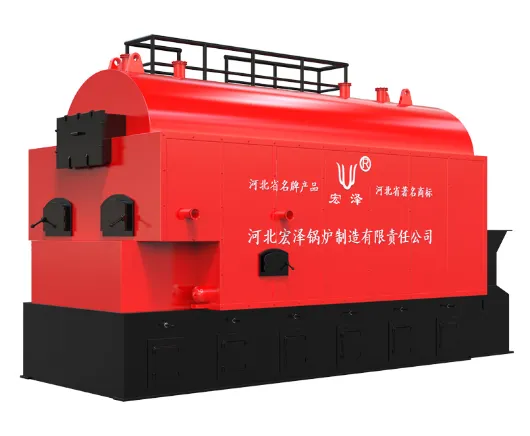
Feb . 19, 2025 10:15 Back to list
Oil-fired hot water boiler
Understanding the intricacies of hot water boilers can offer invaluable insights for homeowners, facility managers, and building technicians alike. These systems, pivotal for heating, differ greatly from their cousin, the standard water heater, by offering a robust solution for larger-scale heating needs. To be well-informed and make knowledgeable decisions, one must explore what hot water boilers are, how they function, and what to consider when selecting one.
Energy efficiency is paramount. Modern hot water boilers boast varying efficiency ratings, often measured by their Annual Fuel Utilization Efficiency (AFUE). Higher AFUE ratings translate to more cost savings over time. Look for models with condensing technology, which recovers heat from exhaust gases, boosting efficiency and meeting today’s stringent environmental standards. Safety certifications, from credible institutions, serve as a testament to the reliability and safety of a boiler system. Remember, a higher initial investment in a quality boiler can yield long-term savings and peace of mind. Another critical consideration is the type of fuel. The choice primarily between natural gas, oil, or electric depends on availability, cost, and environmental concerns. Natural gas is typically more economical and readily available but requires a connection to a municipal supply. Oil provides a consistent performance but involves more storage and emissions, while electric boilers are clean and compact but can result in higher energy costs depending on electricity rates. Routine maintenance cannot be overemphasized in extending the life of a hot water boiler and maintaining optimal performance. Annual inspections by a certified technician help address normal wear and tear, preventing expensive breakdowns during peak usage times. Regular checks ensure that all components, from burners to heat exchangers, operate efficiently and safely. Lastly, consider smart technology integration for greater control and efficiency. Many modern hot water boilers come equipped with integrated smart thermostats and remote access options. These features allow users to monitor and adjust the system's performance in real-time, further enhancing efficiency and convenience. In summary, a hot water boiler is a robust heating solution ideal for those needing efficient, whole-building heat. Understanding its components, operation, and selection criteria can ensure you make informed decisions, optimizing both energy usage and cost-effectiveness. Whether upgrading an existing system or choosing one for a new building, the careful consideration of fuel type, efficiency, and maintenance can significantly impact overall satisfaction and performance.


Energy efficiency is paramount. Modern hot water boilers boast varying efficiency ratings, often measured by their Annual Fuel Utilization Efficiency (AFUE). Higher AFUE ratings translate to more cost savings over time. Look for models with condensing technology, which recovers heat from exhaust gases, boosting efficiency and meeting today’s stringent environmental standards. Safety certifications, from credible institutions, serve as a testament to the reliability and safety of a boiler system. Remember, a higher initial investment in a quality boiler can yield long-term savings and peace of mind. Another critical consideration is the type of fuel. The choice primarily between natural gas, oil, or electric depends on availability, cost, and environmental concerns. Natural gas is typically more economical and readily available but requires a connection to a municipal supply. Oil provides a consistent performance but involves more storage and emissions, while electric boilers are clean and compact but can result in higher energy costs depending on electricity rates. Routine maintenance cannot be overemphasized in extending the life of a hot water boiler and maintaining optimal performance. Annual inspections by a certified technician help address normal wear and tear, preventing expensive breakdowns during peak usage times. Regular checks ensure that all components, from burners to heat exchangers, operate efficiently and safely. Lastly, consider smart technology integration for greater control and efficiency. Many modern hot water boilers come equipped with integrated smart thermostats and remote access options. These features allow users to monitor and adjust the system's performance in real-time, further enhancing efficiency and convenience. In summary, a hot water boiler is a robust heating solution ideal for those needing efficient, whole-building heat. Understanding its components, operation, and selection criteria can ensure you make informed decisions, optimizing both energy usage and cost-effectiveness. Whether upgrading an existing system or choosing one for a new building, the careful consideration of fuel type, efficiency, and maintenance can significantly impact overall satisfaction and performance.
Share
Latest News
-
Efficient Biomass Fired Hot Water Boiler | AI Heating Solution
NewsAug.01,2025
-
High-Efficiency Gas Thermal Oil Boilers | HPT Models
NewsJul.31,2025
-
Oil Fired Hot Water Boilers Sale - High Efficiency & Affordable
NewsJul.31,2025
-
High-Efficiency Commercial Oil Fired Steam Boiler for Industry
NewsJul.30,2025
-
High-Efficiency Biomass Fired Thermal Oil Boiler Solutions
NewsJul.30,2025
-
High Efficiency Gas Fired Thermal Oil Boiler for Industrial Heating
NewsJul.29,2025
Related PRODUCTS
Copyright © 2025 HEBEI HONGZE BOILER MANUFACTURING CO., LTD. All Rights Reserved. Sitemap | Privacy Policy






















